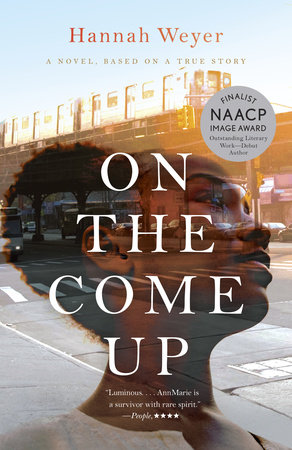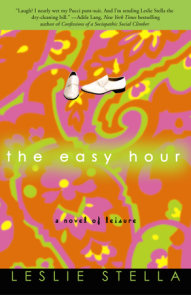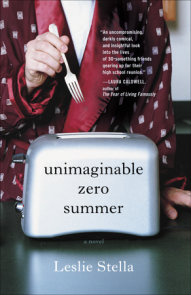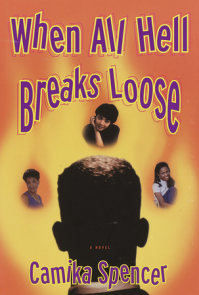READERS GUIDE
The questions and information in this guide are intended to enhance your discussion of On the Come Up by Hannah Weyer.Introduction
Based on a true story, an impassioned and propulsive debut novel about a headstrong girl from Far Rockaway, Queens, who is trying to find her place in the world
Written in an urban vernacular that’s electrifying and intimate, On the Come Up introduces a heroine whose voice is irrepressible, dynamic, and unstintingly honest. Thirteen-year-old AnnMarie Walker dreams of a world beyond Far Rockaway, where the sway of the neighborhood keeps her tied to old ideas about success. While attending a school for pregnant teens, AnnMarie comes across a flyer advertising movie auditions in Manhattan. Astonishingly, improbably, and four months before she’s due to give birth—she lands a lead role. For a time, AnnMarie soars—acting for the camera, flying to the Sundance Film Festival, seeing her face on-screen. But when the film fades from view and the realities of her life set in, AnnMarie’s grit and determination are the only tools left to keep her moving forward.
Told with remarkable compassion and based on the real-life story of Anna Simpson, whom the author met during the filming of the award-winning Our Song, Hannah Weyer’s debut novel is an incredible act of literary ventriloquism that powerfully illuminates the lives of the urban unseen.
Questions and Topics for Discussion
1. The book begins with an illustration of Far Rockaway and some statistics about its geography, etymology, and population. Why do you think the author included this? What role does setting, or place, play in the story, and how does it inform the choices AnnMarie makes?
2. When the reader first meets AnnMarie she is selling homemade popsicles along the beach, wearing a t-shirt that reads “Sexy Sweet.” What do these details signal about AnnMarie? Does her behavior remain consistent throughout the book, or do certain traits change over time? How would you describe AnnMarie at the beginning of the novel? At the end?
3. Crystal’s departure from Far Rockaway is the change in status quo that begins the novel. Why is this incident significant, and how does it set the tone for what follows?
4. What role does family play in the novel? What family legacy does Blessed pass on to AnnMarie? How did AnnMarie’s understanding of her “family tree” shape or influence her choices as an adolescent and teenager?
5. AnnMarie never knew her father. Did his absence influence the choices she made? Did the stories she was told about him shape her imagination and sense of safety?
6. The chapter in which Blessed relives her flight from Trinidad is entitled “Baby Love.” What does this title refer to? AnnMarie refers to her mother as a “hero thief.” What impression or thought does this conjure?
7. How does AnnMarie’s understanding of and sympathy for Blessed change through the course of the book?
8. What factors motivate AnnMarie to want to start a family with Darius?
9. AnnMarie is often either victimized by violence, or retaliating against it. Is her retaliation justified?
10. One theme the book explores is how a child’s sense of self-worth and self-esteem can be stripped by constant contact with violence. Where does this occur in the story?
11. What role does the neighborhood of Far Rockaway play in the story? Describe some of its characteristics.
12. What are the destructive and constructive forces at play in AnnMarie’s life? How does AnnMarie’s exposure to new experiences shift her expectations about herself and those around her? What are some of those experiences?
13. Before meeting Darius, AnnMarie suffers many acts of violence against her — Grandma Mason, Brittany, Carlton. Yet she falls in love with a person prone to violence himself. What do you make of this? Is it true, we seek what we know? Is Darius her protector or violator?
14. When AnnMarie is with Lucinda, she manages to disentangle herself from Darius once and for all. Prior to this, what are some of the steps she takes, consciously and unconsciously, to do so?
15. Ultimately, how does AnnMarie disentangle herself from the people in her life who are violent? Is there a single identifiable point when AnnMarie’s perspective begins to shift?
16. Who are the role models in AnnMarie’s life? How do they directly or indirectly influence the choices she makes?
17. At the end of the book, AnnMarie leaves home to create a new one. What are some ways personal space and/or boundaries are explored in the book?
18. Though the novel is written in the third person, it echoes AnnMarie’s distinctive patois. Why do you think the author decided to tell the story this way? How did it affect your reading experience? How would your experience have changed if the book had been written in grammatically correct English?
19. The book is based on the real life story of Anna Simpson, who co-starred in the film Our Song in 2000. Why do you think the author considered Anna’s story worthy of adaptation? Do you agree?






















